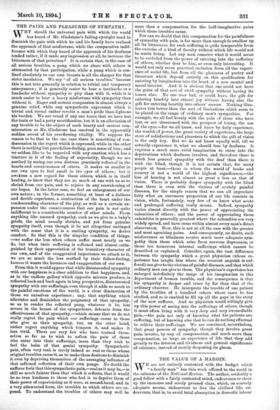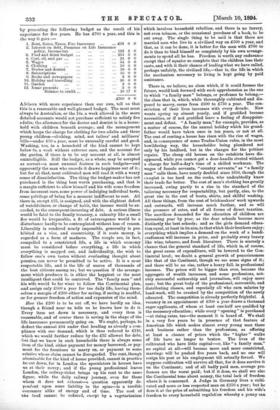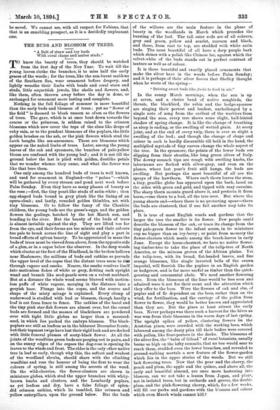THE VALUE OF A MARGIN.
WE are not entirely contented with the budget which "a family man" has this week offered to the world in the columns of the National Review. The author, evidently a good fellow with a fairly contented mind, endeavours to cheer up the immense and sorely pressed class, which, on scarcely adequate means, endeavours to live the civilised life, en- deavours, that is, to avoid total absorption in domestic labour
gay presenting the following budget as the result of his experience for five years. He has 2700 a year, and this is the way it goes :- 1. Rent, Rates, Taxes, Fire Insurance ... ... £93 0 0 2. Interest on debt, Premium on Life Insurance policy, Income-tax 132 2 6 3. Food and drink budget .., 254 0 0 4_ Coal, oil, and gas ... 24 0 0 5. Wages ... ... 54 0 0 6. Clothing ... ... 50 0 0 1. Doctor and dentist 10 0 0 S. Subscriptions ... ..• 16 0 0 9. Books and newspapers .. 3 0
o
10. Holiday and travelling .•. 30 0 0 11. Garden ... ... ... ... 2 0 0 12. Xmas presents ... ... ... 3 0 0 Balance to credit ... •.• 28 17 6
£700 0 0 Advisers with more experience than our own, tell us that this is a reasonable and well-planned budget. The meat must always be Australian, or the 16s. a week allowed in the more detailed accounts would not purchase sufficient to satisfy five adults; the allowance for the doctor and dentist is in a house- hold with children beneath average ; and the management which keeps the charge for clothing for two adults and three young children—clothing, mind, not tailors' and milliners' hills—under 250 a year, must be unusually careful and good. Washing, too, in a household of the kind cannot be kept below 8s. a week without extreme care, and the account for the garden, if there is to be any account at all, is almost unintelligible. Still the budget, as a whole, may be accepted as correct—a most unusual feature in such budgets—and apparently the man who records it draws happiness out of it ; but for all that, most cultivated men will read it with a weary sense of dissatisfaction. The thing the budget-maker has not purchased is the thing best worth purchasing, and that is a margin sufficient to allow himself and his wife some freedom from incessant care, some power of indulging individual taste, some privilege of being for a moment indifferent to cost. All .there is, except 225, is assigned, and with the slightest defect -of watchfulness, or change of habit, the income would be ex- ceeded, to the consequent incurring of debt. A serious illness would be fatal to the family treasury, a calamity like a small Are would be irreparable, a fit of extravagance would be a disturbance hardly to be contemplated without loss of reason. Liberality is rendered nearly impossible, generosity is pro- hibited as a vice, and eccentricity, if it costs money, is regarded as a form of madness. The couple are, in fact, -compelled to a constricted life, a life in which economy mast be considered before everything, a life in which -everything is mapped out, and individuality, the wish to follow one's own tastes without everlasting thought about pennies, can never be permitted to be active. It is a most respectable life, and is the life of scores of thousands of the best citizens among us ; but we question if the arrange- ment which produces it, is either the happiest or the most intelligent that could be contrived. The "family man" and Isis wife would be far wiser to follow the Continental plan, .and assign only 2500 a year for tne daily life, leaving them- -selves a margin of 2200 either for saving, if saving is needful, -or for greater freedom of action and expansion of the mind.
How the 2200 is to be cut off, we have hardly an idea, though a friend near us tells us he knows how to do it. Every item set down is necessary, and every item is -reasonable, and of course there is saving in the shape of the life insurance permanently going on. We ought, perhaps, to 'deduct the annual 284 under that heading as already a com- pliance with our demand, which is thus reduced to 2116, which we would farther reduce by the 232 allowed for debt, .but that we know in such households there is always some -item of the kind, either payment for money borrowed, or pay- ment for the furniture to marry on, or payment to some relative whose claim cannot be disregarded. The rent, though abominable for the kind of house provided, cannot in practice be cut down, for in London the speculators in houses have ns at their mercy; and if the young professional leaves -London, the railway-ticket brings up his rent to the same figure, while the daily railway journey, even for those whom it does not exhaust—a question apparently de- pendent upon some liability in the spine—is a terrible consumer alike of energy and of time. The cost of the food cannot be reduced, except by a vegetarianism
which involves household rebellion, and there is no luxury, not even tobacco, or the occasional purchase of a book, to be cut away. The single thing to be said is that there are married men who live in a civilised way on 2500 a year, and that, as it can be done, it is better for the man with 2700 to do it than to bind himself so completely by his own arrange. ments to spend all he has. Freedom is worth any endurance except that of squalor so complete that the children lose their caste, and with it their chance of leading what we have called, perhaps unfairly, the civilised life,—that is, the life in which the mechanism necessary to living is kept going by paid assistance.
There is, we believe, no class which, if it could foresee the future, would look forward with such apprehension as the one to which "a family man" belongs, or professes to belong,— the class that is, which, while thoroughly cultivated and dis- posed to marry, earns from 2500 to E750 4 year. The con- striction of their lives increases with every decade. New wants spring up almost yearly, and if gratified become necessities, or if not gratified leave a feeling of disappoint- ment and defeat. "A family man," for example, provides, as a matter of course, for the annual holiday which his grand- father would have taken once in ten years, or not at all. The cost of renting a house has risen with the rise of wages, and, in consequence of some Trades-Union rules, in the most bewildering way, the householder being plundered not only by his landlord, but in the charges for the pettiest repairs. The cheap old houses on the outskirts have dis- appeared, while you cannot get a door-handle riveted without a charge for half-a-day's time of a skilled workman. The wages of female servants, "country servants," as "a family man" calls them, have nearly doubled since 1850, though the essayist is too hard on the cooks, who undoubtedly know their trade far better. The cost of men's clothing has greatly increased, owing partly to a rise in the standard of the tailoring necessary for respectability, but partly, also, to the great rise in the cost of boots, shirts, and skilful washing. All these things, from the cost of brickmakers' work upwards and outwards, will increase much farther, and so will the pressure of rates, and of all forms of direct taxation. The sacrifices demanded for the education of children are increasing year by year, as the dear schools become more distinctly the best schools ; and as the girls demand educa- tion equal, at least in its aim, to that which their brothers enjoy; everything which implies a demand on the work of a handi- craftsman will increase in price, and probably every luxury like wine, tobacco, and fresh literature. There is scarcely a chance that the general standard of life, which is, of course, the great cause of expenditure, will be lowered to the Con- tinental level; we doubt a general growth of penuriousness like that of the Continent, though we see some signs of it ; and there will be no rise, rather a heavy fall, in professional incomes. The prizes will be bigger than ever, because the aggregate of wealth increases, and some professions, not- ably successful authorship and journalism, will enjoy more ease; but the great body of the professional, mercantile, and distributing classes, and especially all who earn salaries by head-work, will be crushed by the competition of the newly educated. The competition is already perfectly frightful. A vacancy in an appointment of 2300 a year draws a thousand eager applicants, of whom at least one-half are qualified by the necessary education ; while every " opening " is purchased —at rising rates, too—the moment it is heard of. We shall in a very few years be in presence of that feature of American life which makes almost every young man there seek business rather than the professions, as offering at least a chance of prizes which the " higher " walks of life have no longer to bestow. The lives of the cultivated who have little capital—or, like "a family man," no capital at all—will become more and more constricted, marriage will be pushed five years back, and no one will resign his post or his employment till actually forced. We suppose cultivation will survive all that, for it does survive it on the Continent; and of all badly paid men, average pro- fessors are the worst paid; but if it does, we shall see also the Continental tone about money, the total lack of freedom where it is concerned. A Judge in Germany lives a culti- vated and more or less respected man on 2250 a year ; but he does it at the price of submitting his freedom and his wife's freedom to every household regulation whereby a penny can be saved. We cannot see, with all respect for Fabians, that that is an ennobling prospect, salt is a decidedly unpleasant one.








































 Previous page
Previous page